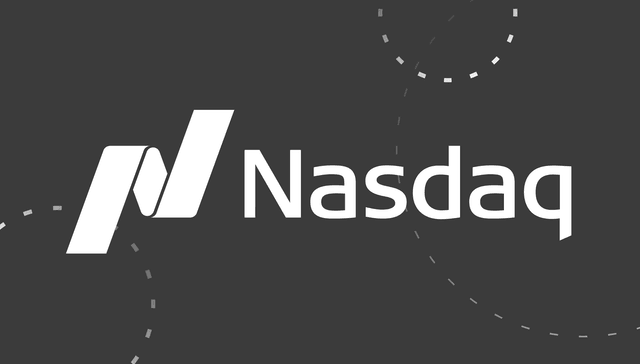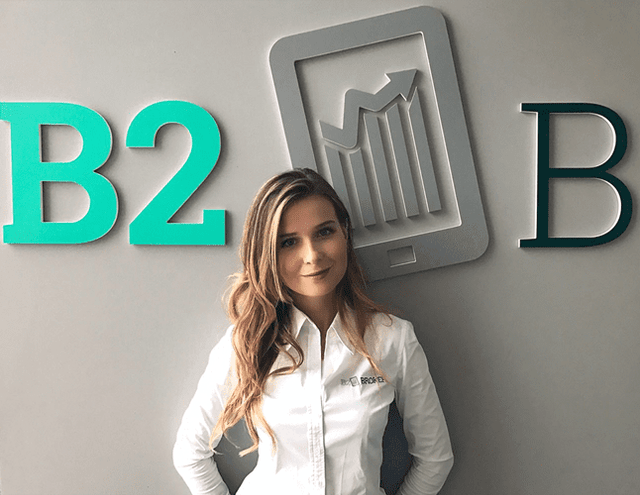Can Zero-Knowledge Proofs Restore Trust In Blockchain?

While blockchain technology was introduced as a secure solution to exchange funds and conduct digital operations, recent years have proven otherwise. As of 2023, the crypto landscape has witnessed numerous fraud cases, cyber breaches, identity theft and other security-related problems.
As this issue becomes more amplified, the brightest minds in the crypto niche are searching for a solution to fit the security ambitions of blockchain. While several proposed theories exist, zero-knowledge proof methodology stands tall above every other suggestion. So, let’s explore the nature and inner workings of ZK-proofs and how they could ensure the long-term security of blockchain networks.
Key Takeaways
- Zero-knowledge proof (ZK-proof) is the theoretical principle of verifying any information without actually seeing its contents.
- ZK-proofs have numerous potential benefits for blockchain, as they could minimise data exposure and eliminate the breach points for malicious attackers.
- ZK-proofs also provide privacy for individuals not to disclose their sensitive information. They are also scalable in the long term.
What Do Zero-Knowledge Proofs (Zk-Proofs) Mean?
Invented at the Massachusetts Institute of Technology (MIT) in the 1980s, the ZK-proof principle is one of the most secure ways to verify information without actually exposing it to additional parties. The ZK-proof is essential in limiting informational access, thus minimising the possibility of data breaches within any network. As the name suggests, ZK-proofs are all about proving the validity of information without knowing about the informational content.
At first, this concept might seem baffling and even impossible. After all, how can a single person prove that they have verified a piece of data without actually showcasing their detailed verification process? To visualise the ZKP principle, let’s analyse a simplified example.
How Do ZK-Proofs Work?
Suppose two individuals wish to conduct the ZK proving process. Person A wants to verify that person B knows which colour is blue or red. Person A has two balls, which are grey from their point of view. However, person B claims they can tell which ball is blue and which is red. So, how does person B prove their knowledge in this case? They can simply ask person A to shuffle the two balls without showing it to person B. Every time, person B will describe the colours of the two balls.
If repeated several times, the probability of merely guessing the ball colours on a whim becomes astronomically slim. Theoretically, person B could still pull it off, but even with ten consecutive guesses, the chances of sheer luck become slim to none. So, person B successfully proves their colour perception skills without relaying the information to person A. Thus, the data is verified without exposing more than one party to its contents.
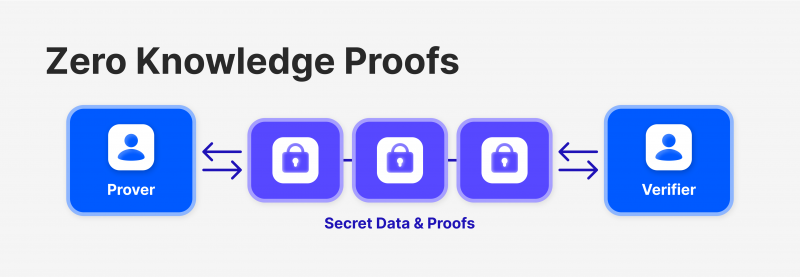
ZKPs in blockchain function precisely like this. However, instead of the ball colours, the network verifiers employ complex mathematical equations to prove the validity of transactions. While the prover solves these mathematical problems repeatedly, the verifier parties receive consistent solution results. If the solutions are correct continually, the probability principle kicks in again, and the blockchain transaction can be considered entirely valid.
Have a Question About Your Brokerage Setup?
Our team is here to guide you — whether you're starting out or expanding.
Zero Knowledge Proof Examples And Applications
There are numerous ways to utilise this state-of-the-art verifying methodology, as privacy and information integrity are paramount in many fields. From politics and tech to finance and e-commerce, such a system would fortify almost any field worldwide. Businesses could receive an improved way to manage customer data without endangering their private information.
Voting procedures can be carried out without exposing the identity of the participants. Individuals can exchange messages and files without sabotaging the security of their private networks. The list goes on and on. ZKP has applications and values far beyond transactional verification, as it could realistically become a go-to system for securing information. However, at this point, the ZKP principle is still in its infancy and must be thoroughly tested to prove its worth in the long term.
Currently, there are two major subtypes of ZKP technology within the blockchain niche – ZK rollups and ZK snarks.
The snark methodology implies a complete and utter lack of interactivity in proving the validity of transactions. Several projects are developing their unique concepts to create non-interactive ZKPs on their network, as it would dramatically increase their security levels.
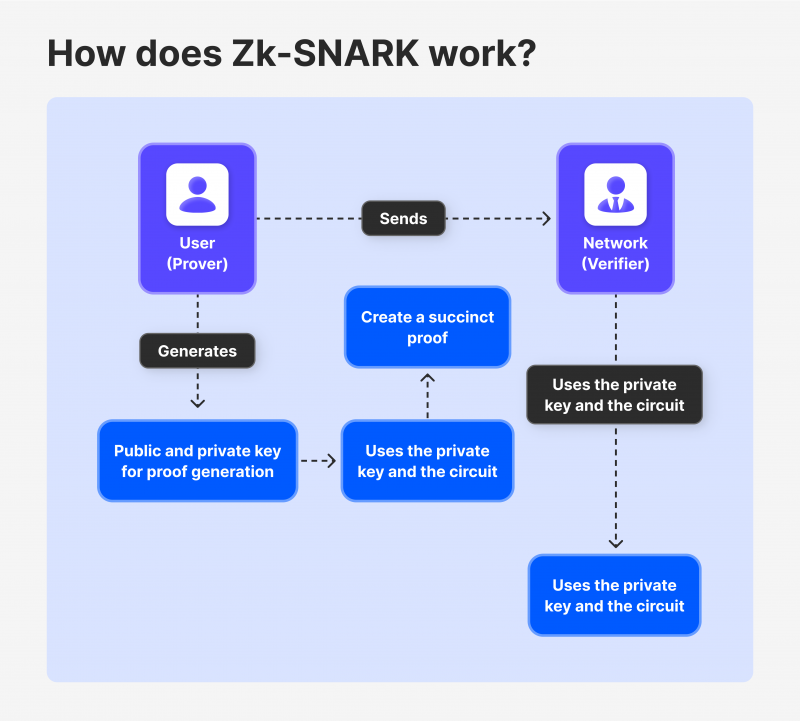
Secondly, the ZK rollups can combine thousands of transaction data into a single verification transaction. This scalability option greatly reduces the network saturation effect and benefits almost any blockchain network worldwide.
ZK-Snarks and ZK-Rollups are often the same, as companies tend to employ both concepts to maximise their security without sacrificing their scaling capabilities. The most notable example of implementing real-life ZKPs is the Polygon ZkEVM, which advocates the massive adoption of zero-knowledge methodologies. However, due to their complex nature, ZKPs have witnessed many roadblocks toward mass popularity. Moreover, ZKPs are yet to be tested for viability in the long term, which makes some of the companies hesitant to implement this methodology in their established networks.
Benefits of ZK Proofs for Blockchain Systems
So, as discussed, ZK-proofs have a long way to go before becoming a new security benchmark for the blockchain industry and even beyond it. However, are the ZK-proofs worth it? What do they provide in exchange for the complex and intricate methodology that is exceedingly hard to implement? Let’s explore.
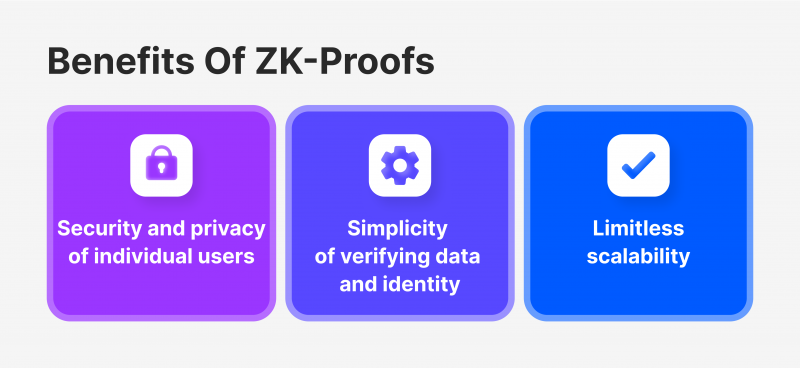
Security and Privacy
Firstly, ZKPs can bring security and privacy to any blockchain network by limiting data exposure to active participants. After all, data breaches don’t occur on their own and malicious attackers need a gateway to access the network. Minimising the data interactions on blockchain networks is the best possible way to rob malicious attackers of their opportunities.
As for privacy, ZKPs can be used to prove your unique identity without actually revealing the entire sensitive information surrounding your profile. For example, individuals can prove their legitimacy to banks, brokerage firms, blockchain networks and other entities without disclosing their private info.
Discover the Tools That Power 500+ Brokerages
Explore our complete ecosystem — from liquidity to CRM to trading infrastructure.
Ease of Use
While adopting the ZKPs is challenging, their utilisation will be exceedingly simple and convenient for users. Once implemented, ZKPs will allow users to prove their identity, exchange information and conduct transactions in seconds.
Scalability
Finally, scalability is a huge aspect of ZK-proofs, as the novel ZK-rollups technology can batch thousands of transactions together for verification. ZK-rollups put the ZK principle to excellent use, utilising only data fragments to prove the validity of transactions. Due to its minimised data requirement, ZK-rollups take much less time and energy than conventional data verification methods like proof-of-work and even proof-of-stake.
Final Thoughts: Can ZK-Proof Save Crypto?
With its strong core idea and elevated security, the ZK principle can potentially eliminate or decrease the ever-present concerns with blockchain. As crypto users grow weary of the cyber crimes and fraud cases in the industry, it is essential to introduce a new and improved way to secure transactions. Despite its complexity, the ZK-proof methodology could solve this dilemma in the long term.
Recommended articles
Recent news





